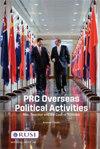Conclusion
Q4 Social Sciences
引用次数: 0
Abstract
Over the past ten years, Gulf politics have significantly evolved. The uncertainties that surround US policy in the region have triggered a hedging strategy by GCC members. Hedging has been conducted in other places: some European countries have arguably followed a similar approach between the US and Russia, while small states in Asia have also attempted to avoid being trapped in the US–China competition by sustaining political and economic ties with both players. But, as underlined at the beginning of this paper, the politics of the Arabian Peninsula have been under the influence of Western partners for so long that the current emergence of hedging policies in the region may be historically more consequential than it has been for others. This trend should neither be ignored nor exaggerated. The erosion of US power in the Middle East logically urges local actors to revise their security arrangements, or at least to reconsider their priorities. At the same time, the economics of Gulf–Asian relations are likely to remain the driving force of the rapprochement, especially in the field of energy and infrastructure investment. However, many unknowns remain regarding the extent of these Gulf–Asian ties. Although countries have expressed a general interest in military cooperation, the operationalisation of this intent has been modest for the most part. Military-to-military ties have increased through the launch of diverse exercises and joint training activities, but initiatives that go beyond operational matters to include strategic dialogues and the signing of defence agreements have not yet materialised. If in the near future, Gulf and Asian countries were to give texture to the military dimension of their relations, it would eventually alter their regional security arrangements and stir sensitive issues such as Gulf relations towards Pakistan or Asian exchanges with Iran. The situation is made even more complex by the current state of Gulf politics. As the previous chapters argued, the Gulf ‘pivot’ towards Asia is a regional phenomenon, but not a regional policy. The Qatar crisis of June 2017 is a strong reminder of the fundamental disagreements among Gulf monarchies, and of the inability of the GCC to play an effective role as a结论
在过去的十年里,海湾政治发生了重大变化。围绕美国在该地区政策的不确定性引发了海湾合作委员会成员国的对冲策略。对冲也在其他地方进行:一些欧洲国家可以说遵循了美国和俄罗斯之间的类似做法,而亚洲的小国也试图通过与双方保持政治和经济联系来避免陷入美中竞争。但是,正如本文开头所强调的,阿拉伯半岛的政治长期以来一直受到西方伙伴的影响,因此该地区目前出现的对冲政策在历史上可能比其他国家更为重要。这一趋势既不应被忽视,也不应被夸大。美国在中东权力的削弱从逻辑上敦促当地行为者修改其安全安排,或者至少重新考虑其优先事项。与此同时,海湾-亚洲关系的经济因素可能仍然是和解的驱动力,尤其是在能源和基础设施投资领域。然而,关于这些海湾-亚洲关系的程度,仍有许多未知因素。尽管各国表达了对军事合作的普遍兴趣,但这一意图的实施在很大程度上是适度的。通过开展多样化的演习和联合训练活动,军方与军方的关系有所加强,但超出作战事项的举措,包括战略对话和签署国防协议,尚未实现。如果在不久的将来,海湾国家和亚洲国家在军事层面赋予其关系以质感,这将最终改变其地区安全安排,并引发敏感问题,如海湾国家与巴基斯坦的关系或亚洲与伊朗的交流。海湾政治的现状使局势变得更加复杂。正如前几章所说,海湾地区转向亚洲是一种地区现象,但不是一种地区政策。2017年6月的卡塔尔危机强烈提醒人们,海湾君主国之间存在根本分歧,海湾合作委员会无法作为
本文章由计算机程序翻译,如有差异,请以英文原文为准。
求助全文
约1分钟内获得全文
求助全文
来源期刊

Whitehall Papers
Social Sciences-Archeology
自引率
0.00%
发文量
12
期刊介绍:
The Whitehall Paper series provides in-depth studies of specific developments, issues or themes in the field of national and international defence and security. Published three times a year, Whitehall Papers reflect the highest standards of original research and analysis, and are invaluable background material for policy-makers and specialists alike.
 求助内容:
求助内容: 应助结果提醒方式:
应助结果提醒方式:


